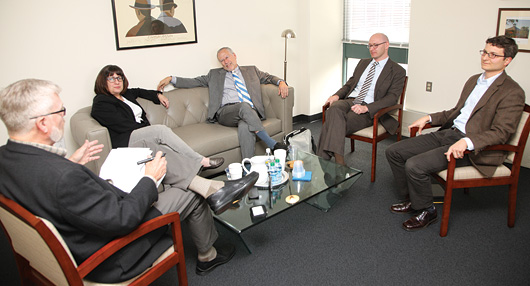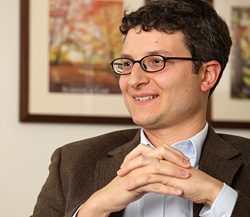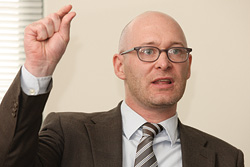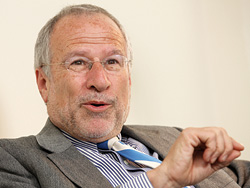
Judging the Bench: Empiricism in the Legal Academy
Judicial Deliberations | Evidence Outside the Trial RecordConstitutional Theory | “Making” Law
Empirical Study of Judicial Deliberations
By Cullen Couch
Why do we vote for this candidate and not that one? Why do we believe we are right, and they are wrong? How do we determine what is fact and what is opinion?
Political scientists and psychologists study these questions carefully, using empirical research to understand how we process information and make sense of our surroundings. In specific cases, they try to tease out the predictive nature of voting patterns or build cognitive theories that attempt to explain why we think the way we do – and, in turn, choose and decide in particular ways.
In their paper, “Cultural Cognition and Public Policy” (cited by this magazine in an article about energy policy in Fall 2010), Professors Dan Kahan and Donald Braman of Yale Law School argue that empirical facts are often irrelevant in a policy debate. According to their research, we create factual beliefs based on our cultural orientations – the degree to which we identify ourselves as hierarchic or egalitarian, individualistic or communitarian – and not on empirical evidence.
In the last twenty years, legal scholars have begun using these insights and other empirical tools to study law itself. What is law? What is legal thinking? And in a paper that appeared in the Virginia Law Review in 1997, former dean of NYU School of Law Richard Revesz turned his attention to judges themselves, employing empirical research to suggest that partisan ideology influenced voting patterns on the D.C. Circuit Court of Appeals.
Using as proxy the views of the party of the appointing president, Revesz wrote, “First, ideology significantly influences judicial decision-making on the D.C. Circuit. Second, ideological voting is more prevalent in cases, such as those raising procedural challenges, that are less likely to be reviewed by the United States Supreme Court. Third, a judge's vote (not just the panel outcome) is greatly affected by the identity of the other judges sitting on the panel; in fact, the party affiliation of the other judges on the panel has a greater bearing on a judge's vote than his or her own affiliation.”
D.C. Circuit Judge Harry Edwards responded, also in the Virginia Law Review, with a scathing rebuke. “None of the three broadly-phrased conclusions of the study are borne out by the study's methodology and findings. Revesz’s article presents some empirical data on a very narrow set of judicial dispositions in connection with review of a limited set of EPA actions in the D.C. Circuit. Because of the narrow focus of his study and the study's highly suspect methodology, the conclusions that Revesz offers are extremely questionable.”
Not backing down, Revesz fired back. “It is somewhat sobering when one of the Nation’s leading federal appellate judges criticizes one’s work with great vehemence. Nonetheless, as this reply makes plain, Chief Judge Edwards is simply wrong with respect to each of the numerous criticisms that he levels against my work. Not a single one of his arguments weakens in any way the force of my findings…”
Revesz’s use of empirical research to predict judicial decisions and Edwards’s flat-out rejection of that methodology created a stir in the academy, inviting legal scholars to leap into the chasm created between Judge Edwards’s “none” and Dean Revesz’s “not a single one.” What was a very public and very spirited exchange opened the door to deeper examination (and more debate between Edwards and legal commentators) about cognition and judging.
“Twenty years ago we weren’t anywhere near this close to admitting the importance of the empirical side…,” says Virginia’s Fred Schauer, David and Mary Harrison Distinguished Professor of Law. Schauer, named one of the three most influential scholars in legal education by National Jurist in 2009, is best known for his work in constitutional law, legal theory, and philosophy. “Doing serious empirical research about judicial behavior, other than in political science departments, was pretty alien to the law school environment. There’s been a huge change in 20 years.”
Michael Gilbert, an associate professor at the Law School, recently published an empirical study of judicial decision-making in the Journal of Legal Studies, and he teaches a seminar on that topic. His latest paper considers the independence of the bench in a new way, breaking down the usual rhetoric about the merits of judicial independence into discrete questions about decisional integrity and outcomes.
“The point I try to make in my paper about judicial independence is that people have long conflated two issues,” says Gilbert. “They’ve said that independence is good because it makes judges more likely to do what the law requires, but it’s bad because it means judges—who wield extraordinary power—are not accountable to the public. People treat this like it’s one issue, a one-dimensional trade-off between independence and accountability. But it’s two-dimensional.”
Naturally, judges find this kind of empirical reductionism to be problematic. “They can try to have statistics about how often a judge would rule this way or that, but other than that, I think it’s just strict speculation,” says Judge Eugene Siler ’63, LL.M. ’95, of the U.S. Court of Appeals for the Sixth Circuit. “Ideology probably plays a role in a small percentage of cases. Death penalty cases create more conflict than just about anything else we have.”
Recently retired Judge Boyce Martin ’63, formerly chief judge of the U.S. Court of Appeals for the Sixth Circuit, says, “It’s hard to define ideology. For many people, the background and the training to get an appointment to be a federal judge means you’ve got to have some political contacts. But I think most judges coming into it have no predetermined political agenda.”
According to Martin, judges base their perspective on their own life experiences. “I have African-American colleagues who have very strong feelings about racial discrimination. I have women colleagues who have strong feelings about sex-based employment discrimination. They come to the bench with strong personal beliefs, not prejudices, on how the cases should be resolved.”
Are these studies meaningful? “Not if the objective is to show that a particular court is divided between people who have a conservative view and people on the other side who have a liberal view,” says Myron Steele ’70, LL.M. ’04, chief justice of the Delaware Supreme Court. “I don’t know what the objective of that might be.” Because Delaware statutes require that an equal number of seats be allocated between Republicans and Democrats, “We don’t even think in those terms,” says Steele.
Virginia Supreme Court Chief Justice Cynthia Kinser ‘77 thinks the research tries “to delve into the judge’s mind. Unless the judge opens up his or her mind and essentially answers what drove the decision, it can only at best be a study. And I don’t think it will always be accurate in its conclusions.”
What practical effect could these studies have on advocacy itself? “In the classroom, we don’t emphasize ideological explanations for judicial decisions,” says Michael Livermore, who teaches administrative law, environmental law, cost-benefit analysis, and executive review of agency decision-making at the Law School. “We’re training lawyers to practice before courts -- and that wouldn’t really help students prepare for practice before courts. Smart advocacy requires a lawyer to do the legal analysis first, and then set up a convincing narrative that might implicate a broader range of values. In the end, you want both pieces to point the judge toward the conclusion that is favorable to your client.”
Certainly, the Revesz study and others like it are vulnerable to the claim that ascribing a judge’s decision to ideology or politics is a facile, even crude, approach.
“There are certainly problems with the way cases in these studies are coded for partisanship,” says Barbara Spellman, who teaches evidence and the intersection of law and psychology at the Law School. “If they just say in a labor law dispute that a Republican would be on the side of management and a Democrat would be on the side of labor, then you’re not looking at the specific issues of the case. Sometimes you’re actually coding it in what other people might think is the wrong direction.”
In the roundtable discussion that follows, Professors Gilbert, Livermore, Schauer, and Spellman explore the rise of empiricism in the legal academy, what it means for the profession and legal education, and how it might affect appellate practice and judicial selection in the future.
Q: The Revesz/Edwards exchange about the D.C. Circuit raises the question: How accurate and useful are the empirical methods scholars use to analyze judicial decision-making?
Livermore: It depends on the question you’re trying to get at. The question of ideological influence on judicial decision-making and how much can be attributed to ideology and how much to law is one that political scientists have been asking for generations. They would often take the United States Supreme Court as their object of study, a very specific court with specific features. The Revesz piece applied some of the same techniques to the circuit courts.
The basis for the analysis is coding case outcomes. For example, in a labor case against management, if labor wins, that’s a liberal outcome. If management wins, that’s a conservative outcome. You compare those outcomes to the political party of the president that appointed the judge and, in essence, the Revesz article showed that Republican appointees vote more for management than Democratic appointees. That started this back-and-forth with Judge Edwards and the broader debate about what this all meant and in particular what, if anything, empirical methodology can tell us about judging.Q: Is it accurate? Freakonomics author, Steven Levitt, linked the number of books at home to the social and economic success of children, suggesting that parents line their shelves with as many books as possible.
Spellman: The number of books is just a proxy. It’s not the causal mechanism.
Q: There are so many things involved in such a conclusion. This idea of presidential appointment bias is also a big leap, isn’t it?
Schauer: In fairness to the people who make this claim, they don’t assert that judges are voting to advance the goals of the party. Rather, they claim that the party of the president is a proxy for a cluster of ideological views. Since you can’t find out directly about the ideological views of the judges, this is a decent proxy for who’s liberal and who’s conservative. Liberal judges vote for liberal political positions in legal cases, conservative judges vote for conservative positions. The liberal/conservative perspective makes more of a difference than you think, and law makes less.
Spellman: Right, with an important caveat: is it accurate? Does it give you something else besides the law?

What is Law?
Q: That raises the question of what, exactly, is “law”?
Schauer: This is partly an empirical question, but it’s also partly a normative question and partly a jurisprudential one. What is law? Everybody says it’s only law. In the three most recent Supreme Court confirmation hearings, Chief Justice Roberts said it’s just law; it’s like calling balls and strikes. He has been, in a way, unfairly castigated for that. He didn’t mean to say it was mechanical. He just meant to say there’s a difference between the rule-maker and the rule-applier. Justice Sotomayor says, yes, my background is relevant but all I do is apply the law. Justice Kagan said it’s law all the way down. They have very different conceptions of what the law is, and they are taking advantage of the setting to use the word “law” and mouth the right words before a confirmation committee to mask very different conceptions of what counts as law.
Judge Richard Posner is a good example. He has a very expansive conception of what counts as law and he is willing to defend it publicly, to his credit. Others have a much narrower conception of what counts as law, and that’s a huge issue.Q: Professor Gilbert, would better empirical research help support your view of the value of judicial independence?
|
Gilbert: Well, it would if you could do it, but I’m not convinced you can. The point I try to make in my paper about judicial independence is that people have long conflated two issues. They’ve said that independence is good because it makes judges more likely to do what the law requires, but it’s bad because it means judges—who wield extraordinary power—are not accountable to the public. People treat this like it’s one issue, a one-dimensional trade-off between independence and accountability. But it’s two-dimensional.
I think about it like this. First, how likely is a judge to do what the law requires when the law is clear? Bracket the question of what counts as law. Second, when the judge does not do what the law requires, either because the law is not clear and doesn’t require a particular thing or because he or she doesn’t feel bound by law, will the judge’s non-legal decision be good or bad? The level of independence a judge enjoys could affect both of those questions. More independence may cause judges to do what the law requires more often—and, when they don’t do what law requires, to make decisions that are lousy.
Data would be constructive on this point. If we could identify a class of disputes that are similar across jurisdictions, but one jurisdiction has independent judges and the other “dependent” judges, then we could look for differences in how they resolve the disputes. If all the judges make the same decisions in those cases where the law is clear, and if in the cases where the law is unclear the dependent judges systematically make decisions that seem better as a matter of policy, then we've really learned something. Suddenly dependent judges look pretty good.
The problem is we first have to confront the very difficult question of what constitutes law. Before you can determine if judges are making decisions consistent with law you have to determine what law requires. And on this we have fundamental disagreements. As long as the outcomes of cases depend at least in part on one’s conception of law, and as long as different people want different outcomes, then the fight over what counts as law will carry on.Livermore: The other thing to keep in mind is that we’re studying a funny part of law. It’s only the part that finds its way into courts, where people more or less disagree about what the law says. There are obviously adjudications where one party knows that it’s wrong and it’s just doing it. But let’s say in the major cases, the cases that we care about, there is a dispute about what the law is. Those are the hardest cases to test. The many other cases where we know what the law is just don’t show up in court because disputes don’t arise. You know what the contracts say, or cases get settled. So we’re looking at a very slim part of how law shapes behavior. The instability that we see in law is really an artifact at some level of the small portion of the law that we’re looking at.
Schauer: Let me say a word in favor of why this is important. Don’t underestimate the denial of even the most obvious empirical parts of this in conventional, everyday commentary and legal scholarship, even about constitutional cases before the Supreme Court. People who criticize Supreme Court outcomes overwhelmingly act as if the justices have made obvious blunders when, in fact, there is a disagreement about policy or morality. Most constitutional law casebooks are overwhelmingly filled with cases and not the other things that might inform judicial decisions. There are lots of people out there who will say they all know that ideology and personal background and the things we have been exposed to make a difference, but when they actually write and comment, they look remarkably constrained by a very narrow conception of law.
Gilbert: And the justices don’t help! They write opinions as if the conclusions they reach are irrefutable and the dissenters, assuming there are any, are clearly off-base. They don’t write even-handed opinions that say, look, there are good arguments on both sides of this case, we’ve picked the side we think is right, but a reasonable person could do the opposite.
We shouldn’t underestimate the other side of this equation, either. There are thousands of people out there, including scholars in political science and other areas, who deny that the law has force under any circumstance, who believe that it’s all politics all the way down.Schauer: The people Michael is talking about are people who think that all of law is the Supreme Court decisions on cases involving the 1st and 14th Amendments and maybe a few other things. If you think that’s all of law, then you’re likely to dramatically overestimate the indeterminacy. Even the legal realists were more sophisticated than they’re given credit for being.
If Not Law, Then What?
Q: If the law isn’t always clear, then how do we decide cases? Political ideology? Isn’t that just a bundle of life experiences?
Gilbert: This is what I was going to say. The work that Revesz did, and that hundreds of political scientists have done in the same vein, is predictive but not explanatory. It’s predictive in the sense that if you know the ideological makeup of the court, you can sometimes predict how the court will come out in a set of cases. But that doesn’t mean you’ve explained why it came out that way. It doesn’t mean you’ve identified which strands in the bundle motivated judges’ decisions.
Here’s one way to think about it. Does Justice Scalia decide cases the way he does because he’s politically conservative or because he’s a textualist? The first, we would say, is an inappropriate basis for adjudication; the second, a perfectly defensible approach to resolving cases. If the way you measure Justice Scalia in your statistical model is with an “R” [Republican], then you can’t distinguish between those two approaches. You may be able to predict Justice Scalia’s votes, but you can’t tell whether he’s motivated by politics or by law.Q: With Justice Scalia, he dissented in the DOMA [Defense of Marriage Act] case, arguing there is “no power under the Constitution to invalidate this democratically adopted legislation.” The day before, he concurred with striking down section 4 of the VRA [Voting Rights Act]. What do you make of that?
|
Spellman: As a psychologist looking at this, I really care more about that explanation than just the correlation, “I’m a conservative. I therefore want it to come out this way, so let me see how I can justify it.” You might say that someone is doing it because they’re a conservative, but I would say there’s no way of showing there is that kind of intent involved. Instead, if a judge has paid more attention to a certain line of cases in the past, and is familiar with those when a new case comes before the court, he or she might see and decide the new case similarly to the cases they’ve seen previously and differently from the ones that are novel.
Once you go looking at things with pre-existing knowledge, with a certain focus, then you’re more likely to come out with certain answers unintentionally just because of what you’ve known in the past. I don’t want to use the word “bias” in the way you look at information because that connotes bad intent, but it’s the angle from which you approach it.Livermore: Another thing to think about is the normative framework. Let’s say that there are legal factors, which should bear on a judge’s decision, and there are non-legal factors that shouldn’t. Sophisticated lawyers know that there are cases where the plain meaning of existing law, applied to the facts, doesn’t mechanically generate an obvious outcome. Judges, sometimes, need to draw on a larger universe of factors: their interpretive preferences, policy intuitions, values, and so on. You need to ask yourself then: What factors should, and what other factors shouldn’t, be part of the calculus to resolve the hard cases?
One of the factors that perhaps shouldn’t affect a judge’s decision is partisan advantage. Say I’m a Republican judge. It would be bad for me to find that voter ID laws are valid simply because I want to benefit the Republican party in future elections. That would be a bad reason, right?
Alternatively, for a judge appointed by a Republican president, maybe that judge was selected knowing he or she had a particular background that would make her more sympathetic to management in labor disputes. Based on that information, we might be able to make predictions about how that judge might act in difficult cases under the National Labor Relations Act. Is that a bad thing, if we accept that values are going to be part of how judges make decisions? That’s obviously a normative question that folks need to ask. My sense would be no, but others might disagree.
Legalists vs. Realists
Q: What is the dispute between the legalists and the realists? That the resulting decision of one or the other is more or less valid?
Schauer: It’s a dispute about the proportional contribution of formal written-down law compared to other stuff in producing judicial outcomes. Virtually no one says it’s all the formal written-down stuff. Virtually no one says it’s none. It’s a dispute about how much of one or the other in what kinds of cases.
Spellman: The formal written-down stuff, though, is the nice straw man.
Schauer: Right.
Q: Then, of course, there is the imperfection of language. It’s hard to pin things down to such a fine degree that it means only one thing. That’s almost impossible, but you did a piece about that in an answer to Posner.
|
Livermore: My point there is that no one’s a formalist and no one’s a realist in the pure sense. Everyone’s in the middle. Yes, we have these fights about realism and legalism, but maybe these fights are all about emphasis rather than content. If you look broadly at the decisions of the federal judiciary and you include in that the unpublished decisions, then you see tremendous agreement among judges on how to apply the law. It looks like it doesn’t matter who the judges are. That’s what I think makes up the formalist position: that you could swap judges and you’ll get the same outcomes.
But if you look only at 1st Amendment and 14th Amendment cases in the Supreme Court you might say you’re stupid if you’re a formalist, because obviously politics is what’s driving these decisions. Change one justice, and you have a totally different outcome. So it’s really a question of emphasis, what part of the law you want to understand, more than it is about actual views about how law affects decision-making.
Spellman: I also think intentionality is part of it in this emphasis on how much is law and how much is something else. But the ugly part, the accusational part, is, “you just wanted Bush to be president so that’s why you found that way and then made up reasons to support that decision,” whereas that doesn’t have to be the case to be a realist. You don’t have to think that it was done intentionally, just that there are extra-legal factors.
Livermore: Extra-legal, which of course takes us back to our question of what counts as a legal factor and what doesn’t?
Partisanship, Ideology, and Cognition
Q: Partisanship is different from ideology, isn’t it? Certainly, it is very rare at the federal level to see a purely partisan decision.
Schauer: It’s rare to see a nakedly partisan opinion. People frequently accuse those who write opinions they disagree with of being nakedly partisan. Indeed, there were all sorts of accusations about naked partisanship in Bush v. Gore, but in fact the number of justices who voted somewhat differently than they had in the past on questions of state power versus federal power were, roughly … all nine of them.
Both sides reversed roles.
Spellman: So you believe that if you had locked them in a room so they didn’t know what was going on in the election and you gave them the story but everywhere the name “Bush” appeared you replaced it with “Gore,” and everywhere the name “Gore” appeared you replaced it with “Bush,” every justice would have decided exactly the opposite way?
Schauer: I don’t know.
Gilbert: This highlights a dilemma in empirical studies of judging. Judges know the stakes when they decide cases. They can see where each line of reasoning leads. So when they reach a particular decision and you study it after the fact, you can’t tell whether the logic led them to that decision or whether they picked the decision they liked first and then backwards-programmed, finding the logic that would get them there. If you could hole up some judges and their cases in one room, and if you could hole up some copycat judges in another room with cases involving opposite sets of facts, and if you could obscure from all of them the relationship between their cases and the world at large, then experiments could really get you somewhere. Good luck with that!
|
Schauer: The most plausible understanding of legal realism, and it’s a widely caricatured position, relates closely to what Mike just said. That is, one of the core claims of the legal realists is that legal decision-makers, most commonly judges, have a pretty strong view about the outcome that they want to reach. They then examine the law in light of their preferred outcome, and many times—not always, but many times—looking at what the law is with this kind of motivation leads them to find the law that supports their initial views. There’s a big literature in psychology called motivated reasoning. There’s this ugly word in some of the recent literature called “myside bias,” but we look at the world in light of preferred outcomes.
Spellman: There’s even a better bias called the “blind spot bias,” where you can find the biases in everybody else but you don’t see the biases in yourself.
Empiricism in Appellate Practice
Livermore: Good lawyers know this stuff, too. Part of the way this plays out is how you argue before judges, how do you convince judges? Obviously, you don’t go to a judge and say, “You’re a Republican, so you vote with my side. I’m going to go collect my paycheck now.” For the same reason, in the classroom, we don’t emphasize ideological explanations for judicial decisions. We’re training lawyers to practice before courts -- and that wouldn’t really help students prepare for practice before courts. Smart advocacy requires a lawyer to do the legal analysis first, and then set up a convincing narrative that might implicate a broader range of values. In the end, you want both pieces to point the judge toward the conclusion that is favorable to your client.
Q: That’s where the empirical research tells you what those proclivities are and how you would navigate that thicket.
Livermore: Who appointed them is actually the least important thing. You can learn a lot more about their judging style, what kinds of arguments they favor and disfavor, by looking at and thinking about their past decisions. I actually don’t think empirical studies to date give you much purchase from an advocacy perspective.
Q: Justice Roberts based his opinion on the constitutionality of the Affordable Care Act on the taxing authority of Congress instead of the Commerce Clause. Is that a preconceived notion that Justice Roberts has in the back of his mind about the proper limits of the Commerce Clause? If so, is that appropriate?
Schauer: It sounds very similar to what John Marshall was accused of doing in Marbury v. Madison. Maybe that sort of sets the ground rules for what’s appropriate and what’s not. Marbury v. Madison involved, under some accounts, John Marshall wanting to tell his arch enemy Thomas Jefferson what to do, but John Marshall knew that he didn’t have an army to back it up. So Marbury v. Madison is a scolding of Thomas Jefferson but ultimately comes down the other way.
Or, under another interpretation of Marbury v. Madison, John Marshall was interested in establishing judicial review but the best way to establish judicial review was to do it in a case in which that wasn’t the major issue, so there’s a long tradition of judges being strategic.Gilbert: This leads to an interesting point, which is that the vast majority of these empirical studies of judging take as their dependent variable -- that is, the thing they’re trying to explain – the judges’ votes or the outcomes of cases. But lawyers often do not care about particular outcomes, they care about the rules cases establish. A political scientist might systematically see correlations between judges’ ideologies and their votes, and he or she may conclude that it’s ideology doing all the work. But it could be that the content of the rules was determined, and the rules thereafter direct behavior, in ways that we would consider quite legalistic and objective.
Livermore: This cuts against what a genuine realist would say: the rules don’t matter. If the rules don’t matter, then what are we fighting about, anyway? We’re spending all this time fighting about the rules, but then if we don’t think the rules matter …
Schauer: And, of course, legal realism is the interesting straw person. No actual realist ever believed that the rules didn’t matter.
Spellman: There’s the formalist straw man and the realist straw man.
Schauer: If we are looking for a straw man for realism, it’s probably Jerome Frank whose flamboyant language encouraged it. If we’re looking for the straw man for formalism, it’s probably Jeremy Bentham who had such contempt for judges that he wanted laws to be written in a stunningly detailed precise fashion so judges would have no power. But, since then, I’m not sure we have any real examples of either.
The Practical Effects of Empirical Research
Q: Where does all this lead? Where will we be in 20 years with empiricism and what practical effect will this have on your students?
Schauer: Twenty years ago we weren’t anywhere near this close to admitting the importance of the empirical side, so it’s easy to quibble now about maybe having gone too far. Thinking it was useful to do serious empirical research about judicial behavior, other than in political science departments, was alien to the law school environment. There’s been a huge change in 20 years.
Q: Will it just gradually gain credence and judges will feel that they’re looked at differently? Will this do anything to the way they hand down decisions?
Spellman: I’m not sure about that, but these days we worry about appointing a diversity of judges. We want to appoint minority judges and female judges and if we truly believed it was just law all the way down, then why should that really matter? You either believe that they’re bringing something different or interesting or important, or as with a jury, you just want it to look good so that people will go with the law because you have some kind of representation.
Remember when Sandra Day O’Connor was the first female justice on the Supreme Court and a magazine cover appeared that said “Justice for All.” Really? One out of nine Supreme Court justices is a conservative woman and now that’s justice for all? So, I think if we learn more about what goes into judging, then there may be more recognition about how important it really is to have diversity on the courts.Q: Empirical studies will back up these arguments in the confirmation process and in appellate practice. Is there a growing body of knowledge that practitioners and legislators will be able to use?
Schauer: I won’t get into the confirmation process. That has been a charade for a hundred years and it’s going to continue to be a charade. Some number of grandstanding senators will ask Judge So-and-so, “Are you going to make new law or are you going to decide cases according to what was set forth by the Founding Fathers?” Anybody smart enough to be in that position knows what the right answer is to that question. I don’t think we’re going to make any progress there. But we may make some progress in terms of scholarship. We may make some progress in terms of how we teach our students. We may make some progress in terms of intelligent commentary.
Gilbert: We may also make progress in understanding why the laws that judges interpret are cast in particular ways. To illustrate, it is a pretty conventional argument that a textualist approach to statutory interpretation limits judicial discretion -- and, by the way, probably tends to produce conservative outcomes. We don’t actually know if those things are true, and there are a variety of reasons to think they’re false, if not across the board then at least in certain circumstances. Empirical studies of judging may cast some light on these issues. If there’s a feedback loop between judges and legislators, those studies could also help us understand and better shape the character of statutes in the first instance — whether they are more rule-like or standard-like and so forth.
Schauer: A good example of this, 123 years ago, was when Congress passed the Sherman Antitrust Act, which prohibits contracts, combinations, and conspiracies in restraint of trade or commerce. Congress thought it was perfectly appropriate to let judges create the body of antitrust law; 120 years after that, the Affordable Care Act is 2,100 pages long. Nobody thought the thing to do here is to tell judges to create the corpus of health care law. I think the change is, in a way, a recognition that judges bring to the table a lot of things other than substantively neutral, technical competence.
Q: Thank you very much.








